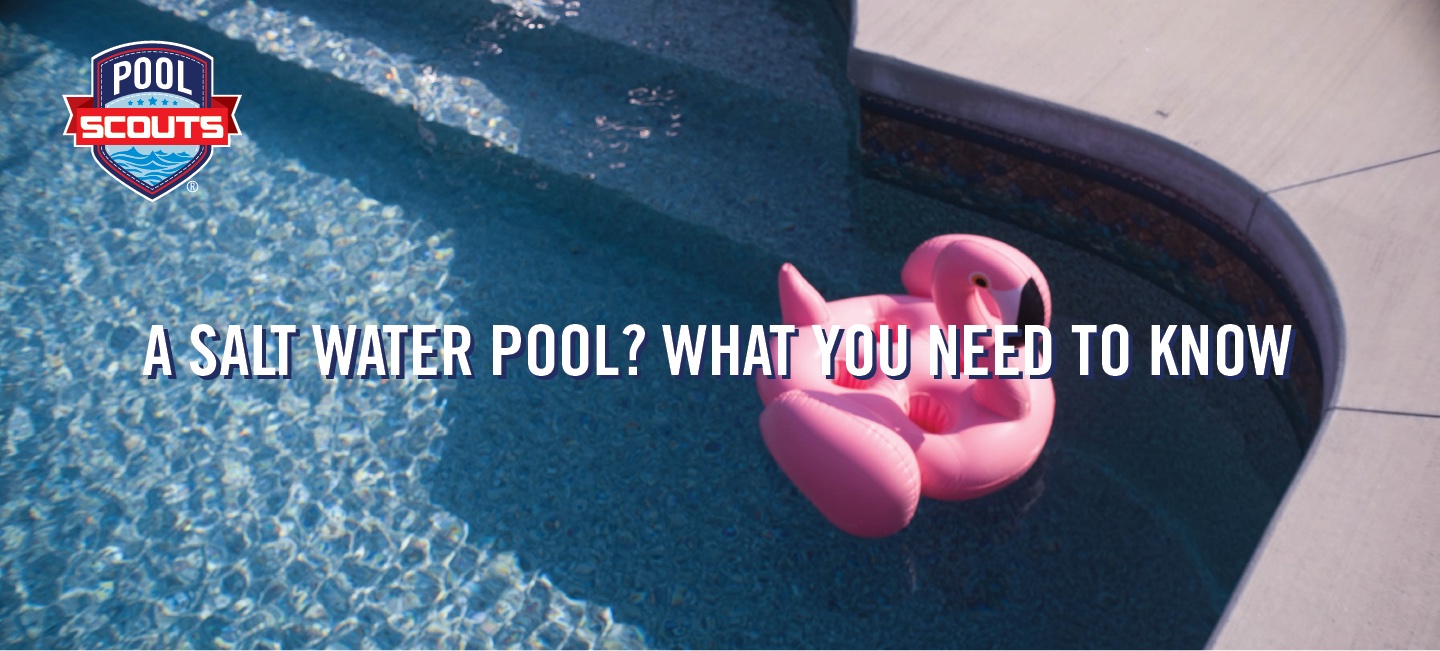
A Saltwater Pool? What You Need to Know
You’ve heard about the pros and cons of saltwater pools (better on the skin but costly upfront), but is switching from chlorine to saltwater the right choice for you and your family? Read on to find out everything you need to know about saltwater pools to help you decide.
What is a Saltwater Pool?
Saltwater pools are increasingly popular among homeowners due to their smooth water feel, lower maintenance, and automation features, but they’re not ideal for every pool type. Fiberglass or vinyl pools are best for saltwater pools, as salt is way too corrosive for concrete/gunite pools. Saltwater pools mainly differ from traditional chlorine pools in their sanitation systems.
How Do Saltwater Pools Work?
First, let’s dispel a common myth: Saltwater pools do still use chlorine — they just use less than a standard chlorine pool. A saltwater generator (more on that later) creates natural chlorine to keep the water clean, rather than disinfecting it via loads of harsh chemicals. That iconic pool smell? Post-swim dryness? Burning eyes? Straight chemical chlorine and its byproduct chloramines are the culprits. But, a saltwater system reduces their total concentration. Here’s how it all works:
Pool-Grade Salt is Added Directly to the Water
Before adding pool-grade salt to the water, check your current salinity levels with a saltwater test strip or a digital salinity tester. Your reading will tell you how much salt needs to be added. Generally, it will take around 270 pounds of salt per 10,000 gallons of water to get to a balanced salinity level between 2,400 and 3,200 parts per million (ppm), and you should have to add salt only once or twice a year.
Note: Be careful not to add too much salt. The only way to lower those levels would be to add more water to your pool to dilute it.
Electrolysis Begins
The newly salted water begins circulating as it’s drawn into the salt chlorine generator (or salt cell), which does exactly what its name implies — generates chlorine via salt. This process, known as electrolysis, starts when the water moves through the low-voltage generator, isolating both components of salt (sodium and chloride) to naturally create chlorine.
The Control Board Keeps Things Running
In addition to providing the energy required to power the salt-to-chlorine conversion, the control board (also a part of the salt chlorine generator) lets you adjust water chlorine levels. You can even hook it up to your pool automation system, so you can easily control those levels remotely with your favorite device.
Are Saltwater Pools Hard to Maintain?
The good news? Saltwater pools are pretty low maintenance, as the salt chlorine generator does most of the heavy lifting, automatically keeping the water sanitized day in and day out. But, as with any pool, you’ll still have some routine tasks. Some will need to be done daily or weekly, while others can be done monthly, quarterly, or yearly. These tasks include:
- Skimming the pool for floating debris
- Shocking the pool to prevent algae growth
- Vacuuming the pool walls/floor
- Circulating the water
- Testing the water chemistry (pH, salinity/alkalinity levels, stabilizer, free chlorine)
- Cleaning salt cell as needed; check for buildup quarterly
- Winterizing the pool
Benefits of Saltwater Pools
Compared to a traditional chlorine pool, saltwater pools have the following advantages:
- Lower maintenance/maintenance costs
- Silkier, smoother-feeling water that’s less irritating to skin and eyes
- The saltwater generator automatically maintains chlorine levels
- Salt doesn’t evaporate from pools –– it is recycled in pool water, so there’s no need to purchase huge amounts or continuously add salt to the water
- Pool salt, rather than pure chemical chlorine, is added to the water; no worry about handling and storing excess harmful chemicals
Disadvantages of Saltwater Pools
Some cons of saltwater pools:
- Higher upfront costs (including purchase and installation of salt cell generator)
- Corrosive; buildup can break down pool equipment, accessories, and outdoor furniture
- More energy usage/ higher electric bill
- The system isn’t DIY friendly; will require expert help for repairs and installations
How Much Does a Saltwater Pool Cost?
Before making any decisions, of course, you’re going to need to know how much a saltwater pool costs. If you’re building a brand-new pool and choose to outfit it with a saltwater system, depending on the size and scale of your project, you could end up paying anywhere between $12,515 and $100,000. Already have a traditional chlorine pool and just looking to convert it? Expect to pay between $500 and $2,110.
How Can I Convert My Chlorine Pool into a Saltwater Pool?
It’s relatively easy (albeit a bit expensive) for homeowners to convert a traditional in-ground pool or above-ground pool into a saltwater one. All you’ll need to do is purchase a salt chlorine generator and have a pro install it for you. Before adding pool-grade salt to your water, you’ll want to drain your pool and refill it; once you add in the salt, the conversion process can begin immediately.
When to Call a Saltwater Pool Care Professional
Once you’ve decided to take the plunge and go with a saltwater pool, keep Pool Scouts in mind for all your pool maintenance needs. We’ll help with everything from installation to maintenance and anything else you need to keep your saltwater pool in pristine condition all season. Give us a call at 844-775-2742 to find out more about our pool services.
